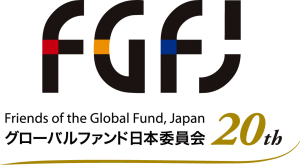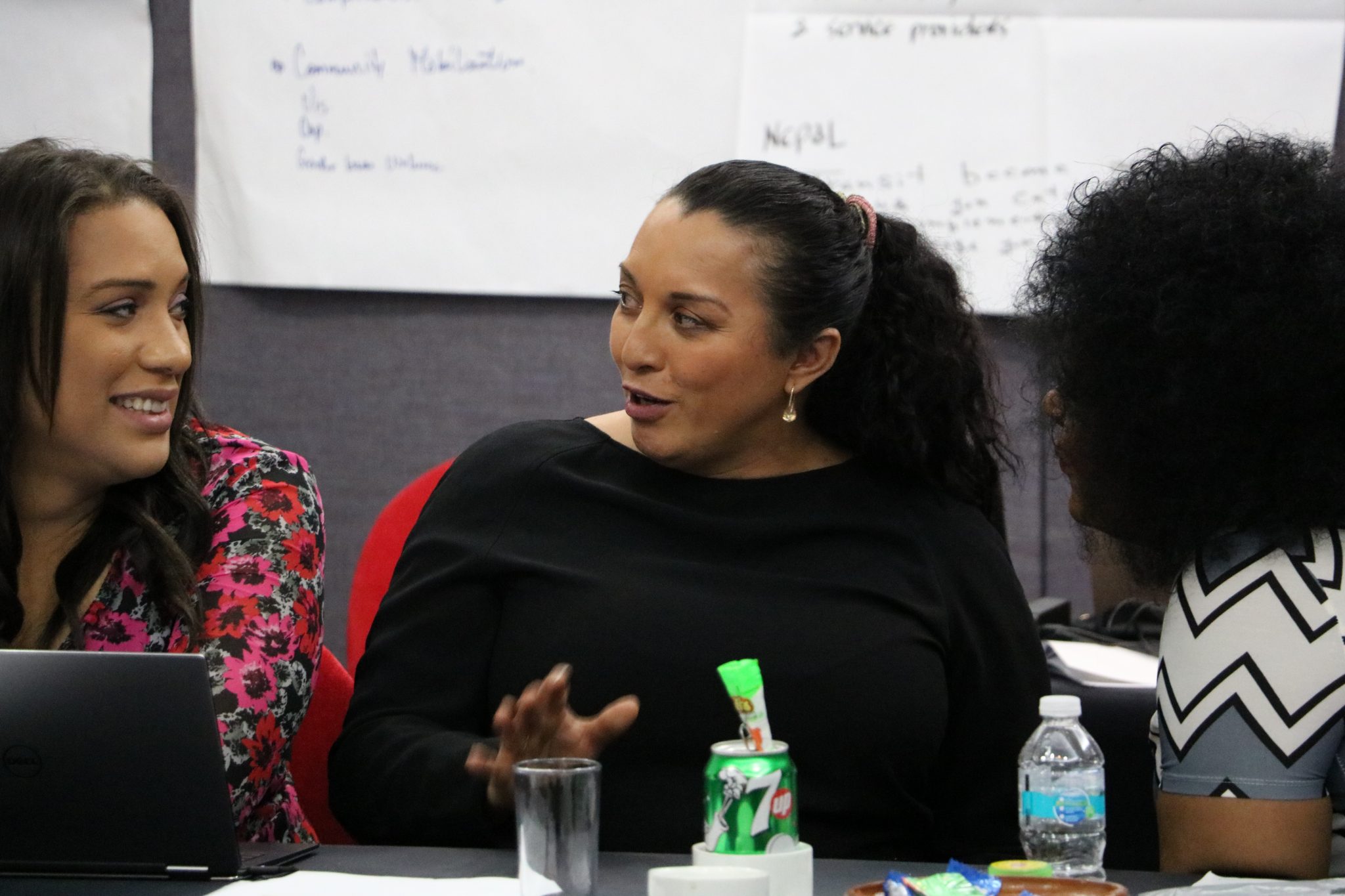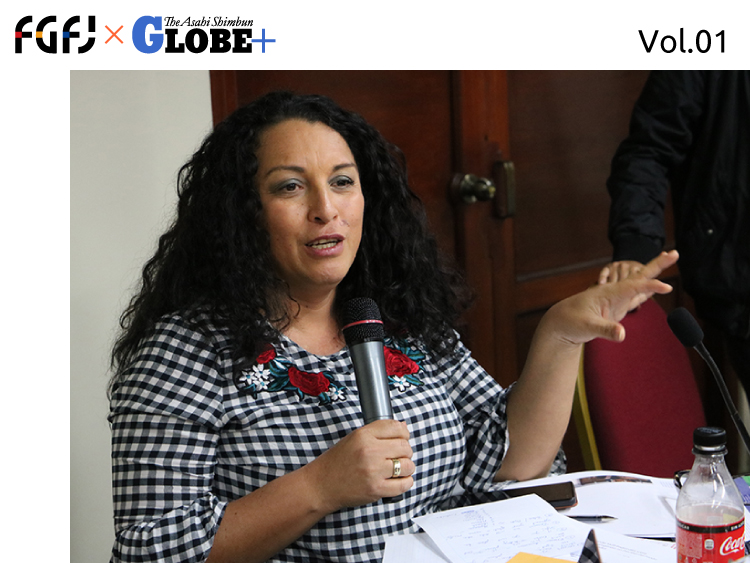
Erika speaks about the role of transgender people in Global Fund decision-making process at an international conference, Peru, 2019.
Behind the news about infectious diseases, where numbers and statistics tend to fly about, there are many human stories that tell the struggles of individuals. The Friends of the Global Fund, Japan (FGFJ) and Asahi GLOBE+ is pleased to launch an interview series highlighting such personal stories. The first interview in the series is with Erika Castellanos, a transgender woman living with HIV who was supposed to take part in the torch relay for the 2020 Tokyo Olympics. Born in Belize, a small country in Central America, she has struggled to come to terms with her gender identity and then after being diagnosed with HIV, to fight for survival. Her story is a series of moments of survival and perseverance, to find a place where she could feel at peace and be accepted for who she is, and to eventually fulfill her dreams. She now advocates internationally towards justice and equality for trans, gender diverse and intersex people, and plays an important role in representing trans people in global key decision-making platforms. Here is her life, her learning, and her message to all of us living in the COVID age.
To read this article in Japanese, please visit the Asahi Shimbun’s GLOBE+ website.
Starting Out
Q: Tell us about yourself before you became an advocate.
I grew up in Belize as part of the indigenous Maya & Mestizo population. I identified as trans from a very young age. Coming from a very conservative family and from a small and religious town, it was a scandal back in those days. I was ambitious in school, but because of this, I was bullied a great deal.
I found it extremely difficult to be a trans in a very conservative society. So at 16, I migrated to Mexico which was comparatively more progressive. When I initially got to Mexico, I was involved in survival sex work and was a drug user as well as homeless. I fell in love with a man who was HIV-positive and lived with him until he died of AIDS. In 1995, I was diagnosed with HIV/AIDS.
Q: The currently available anti-retrovirus treatment for HIV was not developed until 1996. How did you get treatment when you were first diagnosed HIV-positive?
At the time, access to anti-retroviral (ARV) drugs was extremely limited and there were long waiting lists for treatment. To give a little bit of context, the governments in Latin America back then were not providing treatment; it’s not because governments didn’t want to give it; it’s because it wasn’t available. In these early years, I was taking approximately 50 pills a day (18 pills three times each) for HIV and other issues that were triggered by it. The only way that I could ensure a steady supply of medications was by working together with other HIV-positive people to share pills, etc. It was such a difficult time that we would closely track who in the community died and then rush to their homes to go through their belongings and get the various ARV pills before family members would throw them away, just so we could get medications to survive.
It was later that governments, more and more, started to provide medication and, in Latin America, free of cost, which was a huge win. But also, it was a heavy burden for the governments. It’s an additional expenditure that created difficult discussions because back then people associated HIV, and still today many people do, with “bad behavior.” So it was very hard to have discussions, even at the high political level, and to justify spending public money for that perception that says, ‘it’s this group of people who are having sex like crazy. They’re not protecting themselves, they’re using drugs, so then why should we take care of them?’ But it was about survival; either you get the medication, or you [don’t], which meant either you live or you die. So, we would go to government buildings and advocate.
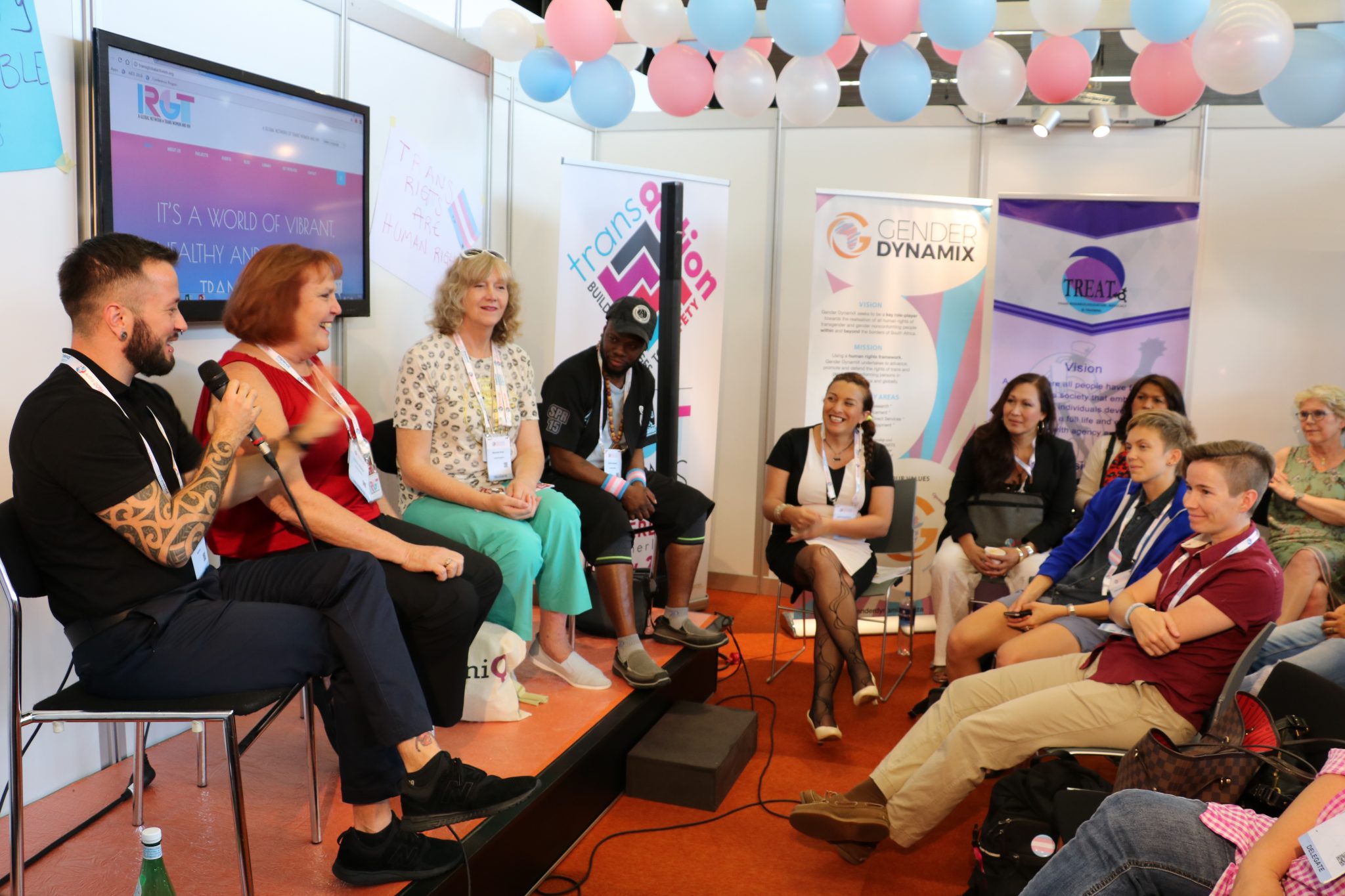
Erika (fifth from left, front row) moderates a panel discussion on HIV prevention tools at the International AIDS Conference, The Netherlands, 2018.
Facing Stigma and Discrimination
Q: You returned to Belize when your partner died. Were you able to continue getting treatment in Belize?
Upon returning to Belize, I was shocked at the inadequate level of services and the discrimination at the medical centres. Often the doctor would not touch me and would sit far away, separated by the desk, even though I was supposed to get a hands-on, physical exam.
When I initially went for treatment in Belize, I was directed to a treatment area for HIV-positive people, which was inside of the hospital morgue, next to the refrigerators with cadavers. The area was intentionally separated from the normal waiting room, ostensibly to protect the privacy of the HIV-positive patients. Patients’ appointments were also set with a 30-minute buffer before and afterwards so we would not run into other patients going in or out.
Q: What do you think was at the root of the discrimination?
It was the lack of education. There were a lot of social issues because people didn’t have information, (so) people were afraid. Even doctors were really afraid. Doctors are also human beings. Shortly after my diagnosis, I started volunteering in a hospice, and in that hospice the goal was to make the last days of people comfortable so that they can have a dignified death. It was a sad situation because families, relatives, and friends would take persons living with HIV and just leave them there. They would never come back for a visit. They would not even pick up the body when the person dies. You cannot expect people to take away all of their prejudice and just snap and change, so it took time. And it took a lot of education and a new generation for things to start changing.
Erika discusses how to implement a comprehensive HIV and sexually -transmitted disease control program for transgender people at a workshop, Mexico 2020.
Becoming an Advocate and Encountering the Global Fund
Q: It must have been difficult just to survive. What made you want to raise your voice and become an advocate?
One of the things that changed my life in the beginning was the first time I saw another person living with HIV that was laughing and making jokes. I have a vivid memory of the waiting room at the hospital where I was being treated, along with others who had contracted HIV. That smile, that laughter was contagious. I wanted to be that person that brings hope, laughter, and smiles to people’s faces.
Q: Then you had your encounter with the Global Fund. Tell us about the role played by the Global Fund in your life.
The Global Fund to Fight AIDS, Tuberculosis, and Malaria (The Global Fund) is an innovative financing mechanism created in 2002 that provides support to low- and middle-income countries in the response to the three diseases and in strengthening their health systems. It mobilizes and invests more than US$4 billion a year to support programs run by local experts in more than 100 countries and regions.
When I first learned about the Global Fund, it was [through a program it supported on] training for leadership development with people living with HIV in Central America.
In 2010, with the help of the Global Fund, I formed a network of persons living with HIV called the Collaborative Network for Persons Living with HIV (C-NET+) – Belize to provide psychosocial support, peer education, and activities to fight stigma and discrimination.
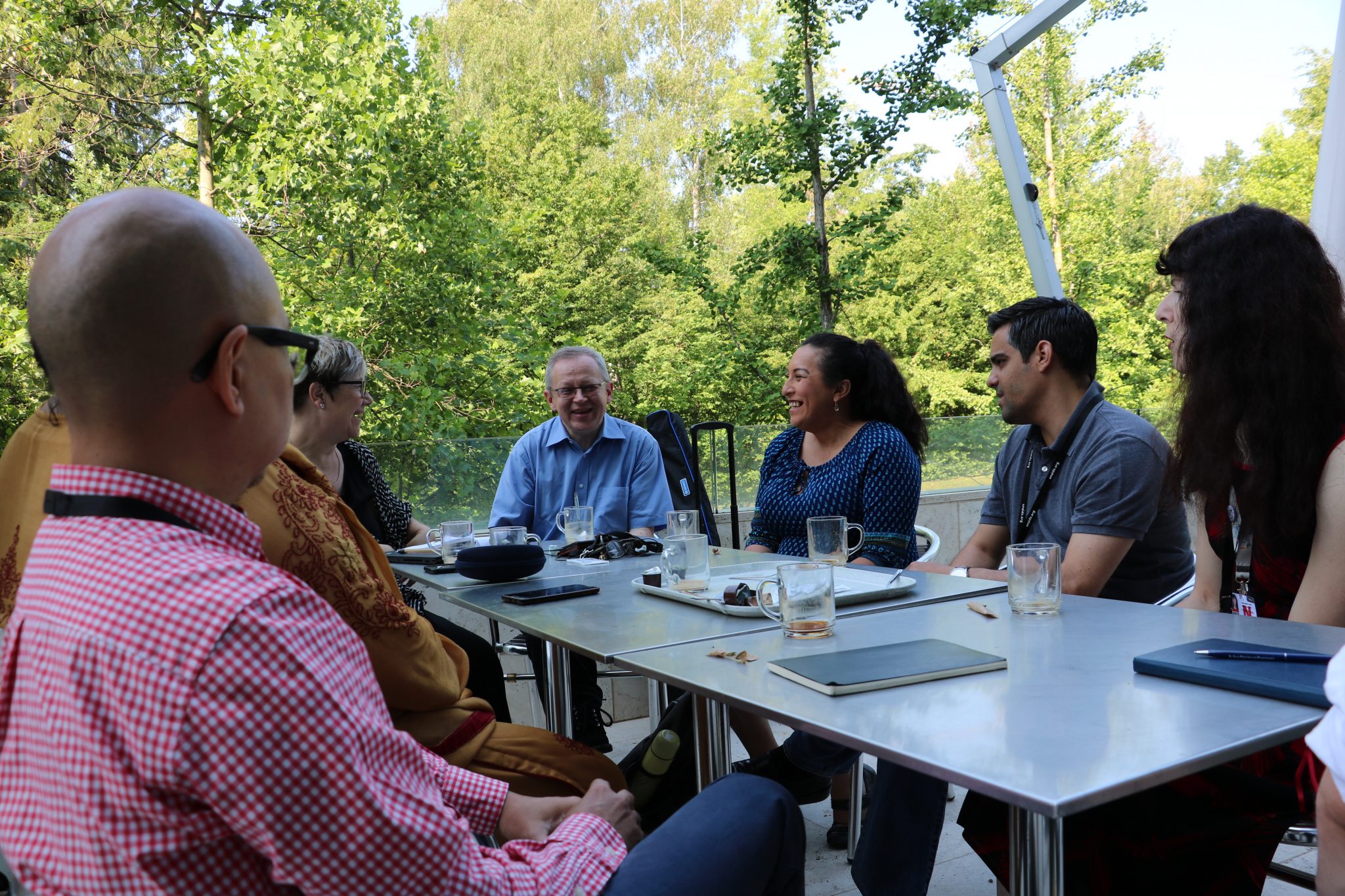
Erika (third from right) discusses with UNAIDS representatives and transgender activists as part of the United Nations Joint Transgender Advocacy Week events, Geneva, 2019.
Q: Tell us about the activities of C-NET+.
Despite the fact that Belize has one of the highest rates of HIV positivity in Central America, its statistics did not include LGBT people. However, looking at the examples of other neighboring countries, we thought the HIV-positive rate among gay men and transgender women must be quite high, and we were keenly aware of the need for support. Moreover, there were few other such organizations at the time. We started by getting people together, one by one. We had a hard time finding positive people because they were afraid of discrimination, prejudice and violence against LGBT people in addition to HIV transmission.
We also taught HIV/AIDS literacy to doctors/health professionals and to the people living with HIV/AIDS (PLWHA) around the country. For example, we taught them to keep a daily diary of symptoms and any changes related to their health, instructing them on how to share this with their doctors to help their treatment. We wanted to have the HIV-positive people take “ownership over their own health,” which was a challenge in a conservative society where people normally would never question what a doctor says.
Having suffered loneliness, discrimination and prejudice as a person living with HIV and as a transgender woman, there is a lot we can learn from each other’s lives and experiences and talk to each other from the same perspective. And what I love more than anything else is to see my friends who have been depressed stand up and start moving towards the future.
Q: You mentioned having your life saved by the Global Fund.
In 2003, I went to a Global Fund meeting in Panama City. If it wasn’t for going to this meeting sponsored by the Global Fund, and going to a laboratory that had funds from the Global Fund, I wouldn’t know that my medication was not working. I knew something was wrong because I was not feeling well, but there was no equipment in Belize for testing viral loads. If I could not have accessed the medication I needed, I wouldn’t be alive today.
Without help from the Global Fund, I would not have been able to improve my ability to advocate for myself and my peers, and to help improve health and community systems in my country. On a more global level, I served as a a member of the Communities Delegation and as an alternate board member to the Board of the Global Fund. Beyond saving my life, the Global Fund has given me the opportunity to help save other people’s lives and make my life more meaningful.
Facing COVID-19
Q: What can you say about COVID-19 from your own experiences fighting HIV?
What we have seen with COVID is that, up to now, we don’t have all the information about it. Over the past year, we have heard, “use masks, don’t use masks. It can be spread through droplets, it cannot be spread through droplets, etc.” So, we have had a bombardment of information and misinformation. In situations like this, a lot of society panics. Health systems are overwhelmed because of the need for attention.
One thing that we have learned from the HIV response is the huge difference that community can do to educate the public, to ensure that the fears and the anxiety for X or Y disease are mitigated with facts and actual information, but also helping relieve the health systems from being overburdened. So, community has played a role in education through its peers; like what precautions to take, even as far as doing testing in the community.
And maybe we haven’t reached that stage where officials will say, “Ok, let’s start community testing for COVID.” It took more than 15 years for it to happen with HIV. But I think that there are many things that have proven to be effective that took a long time in the HIV response. I hope we don’t take that long of a time to accept them for COVID, and that we don’t repeat the same mistakes because in many countries we are seeing governments and people make the same mistakes as they did at the beginning of the HIV epidemic: stigmatizing, discriminating, and criminalizing people. We have seen in some countries, governments taking policies that negatively affect people, and policies that were taken out of fear, not out of science. It’s the same thing that happened in the HIV epidemic. We are not looking back at history, and we are letting things repeat itself.
Q: What do you think is needed now in this age of COVID-19?
I think we need to start looking at everything as a whole. Today it is COVID, tomorrow it’s going to be something else. So I think that everyone – rich countries, poor countries – should start addressing the needs of the world as a whole. One of the things we need to start conversations about is being prepared for whatever comes our way. How do we ensure that we are so prepared that we at least will be stable [no] matter what storm hits us? And the best way to do that in my mind is to look at a person and look at the needs of the person. Right now I think our health systems operate by saying, “I want to take away disease from you.” We are worried about the absence of disease, but I think we need to take a step beyond and talk about well-being. What do you need to be well as an individual? Not only the absence of disease, but also being prepared for any disease.
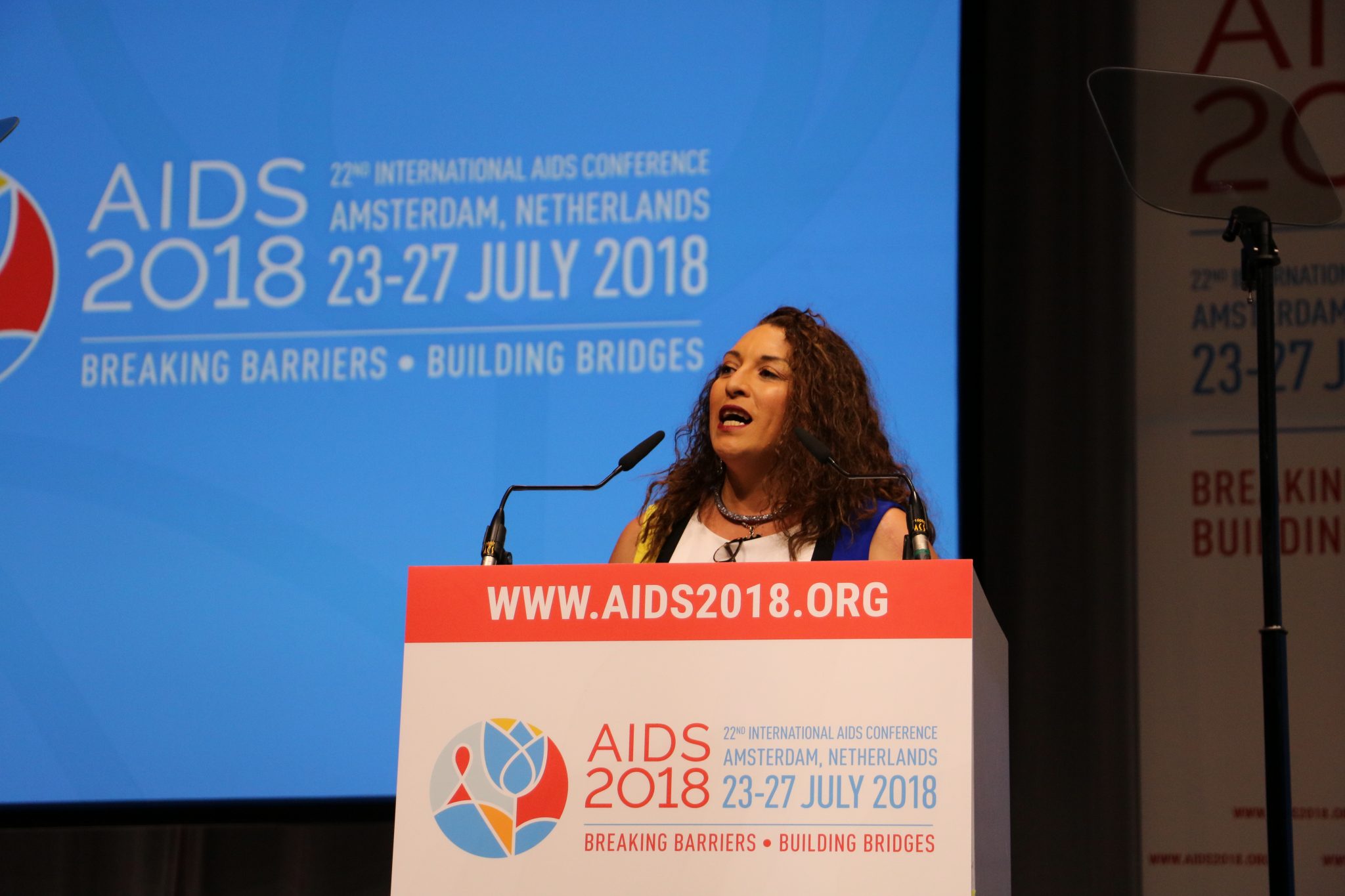
Erika giving a speech on behalf of the community at the closing ceremony of the International AIDS Conference, Netherlands 2018.
A Final Message to the Readers
I now live in the Netherlands with my husband and son. It was a dream. In my circumstances, I thought that’s not ever going to happen. Other people don’t even think about it because it’s so normal, it’s a given, to get married and have children. But for some communities, it’s a dream, and it’s a dream come true if it happens. And it’s not because it’s not possible, it’s not because you can’t find somebody that loves you. It’s because it’s a very small amount of countries in the world where it’s actually possible. I think [my case] can serve as an inspiration, or an example that, if you believe in something, you work hard for it, you advocate, you document, you make networks, [then] you can make it happen.
One should always believe in your dreams and your goals in life. The lower you think you are, means the higher you can go. If you think you’re already in the fifth, tenth floor, you can only go one or two floors up, but if you’re on the first floor, you have so many floors to go up yet. So, you just need to work hard for what you believe.
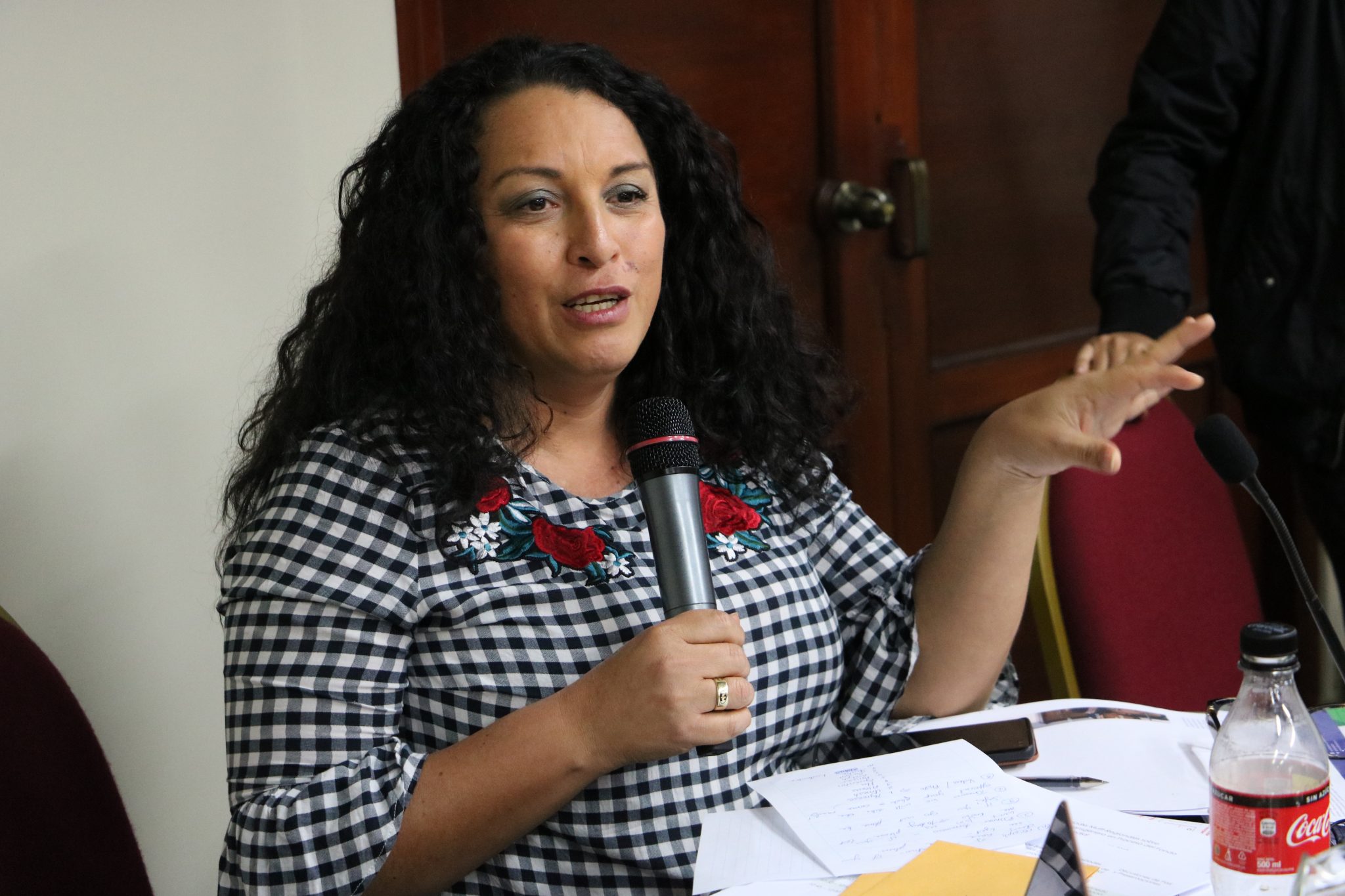 About Erika Castellanos
About Erika Castellanos
Erika Castellanos moved to Mexico from Belize in the 1990s to live more freely as an openly LGBT person. After being diagnosed HIV-positive in 1995, she was able to access the treatment and services she needed through her partner in Mexico until he passed away. Upon returning to Belize, she was shocked at the level of services available for positive people and the discrimination at the medical centres. In 2010, Erika and a few friends formed a network of persons living with HIV. From 2011-2016, Erika was Executive Director of Collaborative Network for Persons Living with HIV (C-NET+) – Belize, which provides psychosocial support, peer education and activities to fight stigma and discrimination and actively worked to implement and oversee Global Fund programmes in her country. She now contributes as an adviser to C-NET+.
Erika credits the Global Fund for improving her ability to advocate for herself and her peers and to help improve health and community systems in her country. She is currently Director of Programs at Global Action for Trans* Equality, was Vice-Chair of the Board of the Global Network of People Living with HIV (GNP+) from 2015 to 2017, member of the Communities Delegation where she is now the alternate board member to the Board of the Global Fund, and founding member of the ViiV Positive Action Advisory Council.
To read more interviews like this one, please visit the main “Infectious Diseases Without Borders—Our Story” series page.
For interview content in Japanese, please visit the Asahi Shimbun GLOBE+ website.

